Burbank residents may have seen EVs, or electric vehicles, charging at curbside charging stations since last month.
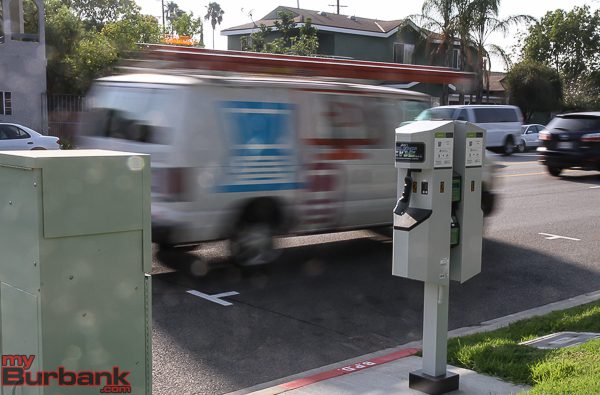
That is because Burbank Water and Power has initiated a curbside charging program, funded mostly by a grant, to determine how much electric vehicle owners will use such charging stations. It makes Burbank the first city with such a program, BWP officials said.
The program comes after 11 charging stations were installed in December 2011, mostly around downtown Burbank, in private areas such as parking lots outside of retail establishments.
Since then, the utility has looked at other possibilities for charging stations, Kapil Kulkarni, of the utility’s marketing department, said.
“Equipment is getting a lot better and smaller, and this was the next step,” Kulkarni said. “Once in use, we will see if it is more convenient to put the chargers on the sidewalk or in private areas like a parking lot.”
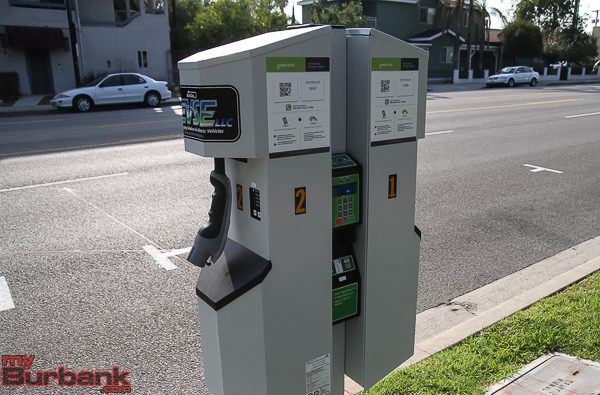
Kulkarni noted the increase in the use of the first 11 chargers.
“The total energy sold has doubled nearly every year, and we have sold [nearly] as much energy through July 2015 as we did in all of 2014,” Kulkarni said in an email. “We can then use the revenue generated through charging activity and federal and state grants to help pay for new stations.”
Through July 31, 6,704 charging sessions were logged, for a total of 49,5122 kilowatt hours (kWh). In all of 2014, there were 7,725 charging sessions and 51,623 kWh, according to BWP.
Now, eight Level 2 chargers were installed at eight sites throughout the city in late July and early August, that allow for two cars to charge, curbside, at each site.
The curbside chargers are located at Hollywood Way and Victory Boulevard, on Hollywood Way near Porto’s Bakery and next to the Buena Vista Library, among other areas.
Plans for additional chargers at Burbank Bob Hope Airport and at the Empire Center could materialize by the first quarter of 2016, Kulkarni said. Some of these chargers may be Fast Chargers that can charge a car in 30 minutes. The existing Level 2 chargers take between two to four hours, he said.
“This is part of our strategy of transportation electrification,” Kulkarni said, “where we can clean our transportation and our air, using electricity that is reliable and affordable.”
The cost of the chargers was about $230,000, and the utility received a California Department of Energy grant of about $165,000 to cover the majority of the cost, with the remainder coming from the BWP budget, Kulkarni said.
While Kulkarni was unsure of which other cities were embarking on curbside charging programs, he noted downtown Los Angeles has one curbside charger.
Sven Thesen, a Palo Alto resident who in 2013 installed what is likely the nation’s first residential curbside EV charger and spearheaded Palo Alto’s ground breaking EV infrastructure regulations, said Palo Alto has at least three curbside chargers.
According to a Philadelphia news article, in December, Berkeley, Calif., approved a pilot program to award 25 permits for curbside electrical chargers. Philadelphia itself offers special parking permits for EV owners who want to install curbside chargers.
For a map of the new curbside EV charging stations, visit:
https://www.












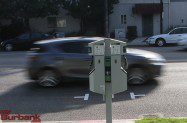

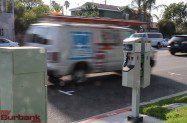

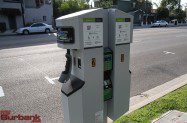
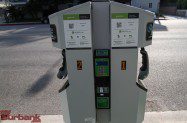
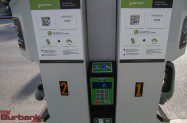












Great article! We need more curbside charge stations!
Here in Santa Monica, we have the first municipal curbside stations on Montana Ave. I can attest that they are the two most heavily used stations in all of Santa Monica’s 50+ charge stations.
One question the article didn’t cover was the price per kWh. Since they are being heavily used, I suspect it’s a fair price. But it would be nice to know what price works since some EVSE providers charge too much and get minimal use. It’s good to find a happy medium.
Hi Paul,
Good question. I see that when the initial set of 11 chargers were installed in 2011, the price was $2, but subject to change. There’s also: http://www.burbankwaterandpower.com/electric/residential-electric-rates-and-charges. If I’m reading this correctly, looks like the cost ranges from about $.08 to $.25 (as of June 2015).
Thanks for reading!
-mh
Hi Paul / Maria,
Thanks for your comments. The charging fee is 17 cents per kWh during nearly all hours, and 31 cents/kWh for summer weekday hours between 4pm and 7pm. There are no minimum or monthly fees, and these rates are similar to usual residential and commercial electric rates, and much more competitive than the rates offered by some of the private charging networks. We don’t believe in free charging (which passes the costs to all ratepayers) but we don’t believe in rates that gouge the customers and discourage charging. We then use the charging revenue to build new chargers.
Sincerely,
Kapil Kulkarni
BWP EV Program Manager
Thank you for clarifying, Kapil.
Comments are closed.